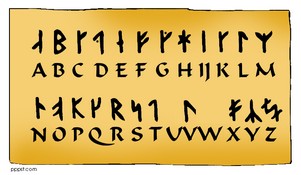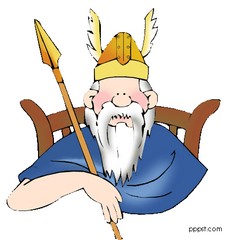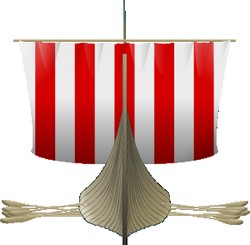Hello, Year 8!
This short unit will give you an insight into how people in eleventh-century Europe thought, dealt with disputes and fought for power. The class presentation can be downloaded HERE (high-quality version) or HERE (smaller version). You can also view it directly below.
 Our topic is the victorious Normans who, after a short, bloody battle and a long campaign of ruthless oppression, wrested England from its Anglo-Saxon rulers and established a Norman monarchy and aristocracy. Of course, the Anglo-Saxon peasants continued to work the land and speak an early form of English to their own children and to the children of the Norman nobility. Consequently, somewhat against expectation, it was the English language that eventually won the day — but only after a significant influx of Norman French words. It is no coincidence that many of the English words for power, law and government are derived from Old French.
Our topic is the victorious Normans who, after a short, bloody battle and a long campaign of ruthless oppression, wrested England from its Anglo-Saxon rulers and established a Norman monarchy and aristocracy. Of course, the Anglo-Saxon peasants continued to work the land and speak an early form of English to their own children and to the children of the Norman nobility. Consequently, somewhat against expectation, it was the English language that eventually won the day — but only after a significant influx of Norman French words. It is no coincidence that many of the English words for power, law and government are derived from Old French.
The Normans were to have a significant impact on the history of medieval Europe. Their name gives us a hint as to their identity: originally “Northmen” from Scandinavia, they settled in what is now France, where they were granted a duchy, married Frankish women, learned to speak medieval French and continued their quest for the acquisition of new land. They were warlike, feisty and ambitious people. Their duchy was called “Normandy”. This is also the part of France where the Allies landed on June 6, 1944, in order to liberate continental Europe from Nazi control.
The story of the Norman conquest of England illustrates just how common wars and battles were in the Middle Ages. One reason for this was that resolving a dispute through discussion and diplomacy was a foreign concept for the ruling classes. Since many of them belonged to an elite warrior class who had spent their childhood and their teenage years learning how to fight, they expected to go to war. After all, this was what they had been trained to do. Battles represented an opportunity for them to show their valour, further their reputation and, most importantly, gain land, the supreme symbol of medieval wealth.
 In this period of history, land ownership was a sign of prestige and a proof of the king’s favour. Whoever possessed and dominated the land, often by building intimidating and impregnable castles, controlled the people. Kings gave out land to show their favour; lords and knights, in turn, doled out land to the peasants in return for their labour.
In this period of history, land ownership was a sign of prestige and a proof of the king’s favour. Whoever possessed and dominated the land, often by building intimidating and impregnable castles, controlled the people. Kings gave out land to show their favour; lords and knights, in turn, doled out land to the peasants in return for their labour.
The presentation below will reveal many other aspects of the Norman Conquest and medieval life. You can also try some other activities that will allow you to learn and revise the details and discover more about how a ruthless conqueror operated in the Middle Ages.
Kind regards from Ms Green
Quick Knowledge Check (based on the text above)
[embeddoc url=”https://year7historygr.edublogs.org/files/2018/08/Norman-Conquest-2018-for-upload-1rm5ml7-27sphyb.pdf” height=”580px” download=”all” viewer=”google” ]
Vocabulary Handout: Vocabulary Exercises based on Presentation
Other Online Activities
1 Quick flashcards –> Play the matching game. Then play BINGO.
2 Primary Sources on the Norman Conquest
3 Crossword on the Norman Conquest
4 Quick Quiz: The Battle of Hastings
5 Edupuzzle: The Animated Bayeux Tapestry
6 Kahoot on the Norman Conquest: Class Mode | Preview Mode
7 Recommended Links
- BBC Bitesize on the Norman Conquest
- BBC Bitesize on the Domesday Book
- The Domesday Book Online
- Battle of Stamford Bridge
- History.com on the Battle of Hastings
- A straightforward summary
- Historyextra.com – 10 surprising facts about the Norman Conquest
- The whole tapestry with translations of the Latin
- Summary – This includes the text of William’s final confession
8 Recommended Videos
- The Battle of Stamford Bridge
- BBC: The Battle of Hastings
- Simon Schama: The Battle of Hastings
- BazBattles: The Battle of Hastings
- An Animated Version of the Bayeux Tapestry
- The Norman Conquest of England in 3 Minutes
- How the Normans Changed the History of Europe
- Why you swear in Anglo-Saxon and order fancy food in French
- The Feudal System and the Domesday Book



